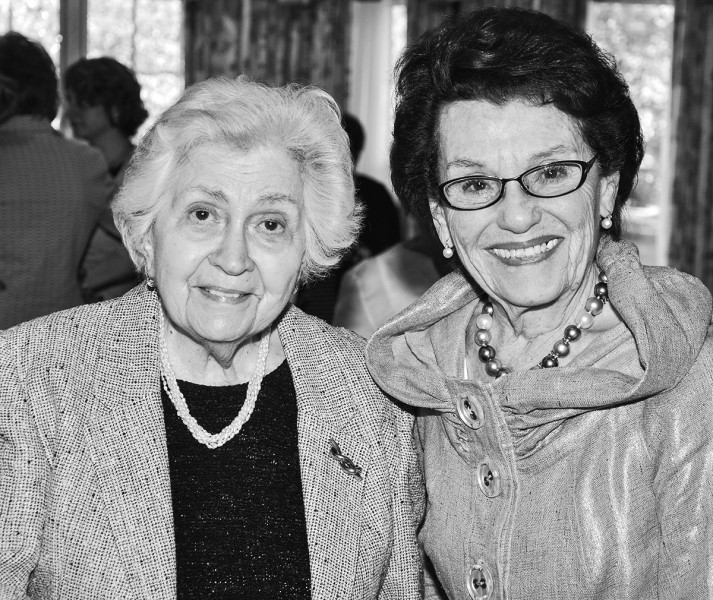An outstanding women’s group enters the archives
I wanted to write an article about the long and storied history of women in invigorating and enlivening the Rhode Island Jewish community, but where to begin? Even in the period when women were not often seen in the workplace, Jewish women were a force throughout Rhode Island. I believe that Eleanor Horvitz, one of my predecessors as librarian here at the Rhode Island Jewish Historical Society, said it best. She wrote, “In the documentation of the charitable acts of the Rhode Island Jewish women ... every year has been ‘the year of the woman’.”
As I began to dig deeper into the topic, I noticed that many of the seemingly disparate public roles that Jewish women held long ago in Rhode Island were connected to one organization. The name arose when I looked into a Girl Scout troop based in the Jewish Community Center. A rumor of unofficial cooperation and shared board members came up when I looked into the earliest history of The Miriam Hospital Women’s Association. Not only was this organization involved with the building of the first Miriam Hospital, but it also started the conversation by running its free-clinic-style predecessor, the North End Dispensary. While the rest of the Jewish community argued over the appropriateness of a separate hospital for the Jewish population, the women saw a need and acted swiftly.
The name of the organization that kept popping up: the Rhode Island Section of the National Council of Jewish Women.
The history of the local chapter of the NCJW would fill a large tome – and easily fill an entire issue of the RIJHA Notes, our annual journal on local history. For over 100 years, the women in this group would identify community needs, find a solution, and run with it. Such as the Council Thrift Shop, the resettlement of recent Russian Jewish immigrants, and their work to stop gun violence, to name a few. (The Rhode Island Jewish Historical Association archives hold all of the records for the NCJW, and they are available for anyone who would like to visit and read them.)
Articles in the historical association’s Notes, as well as in The Jewish Herald and The Jewish Voice, have touched on important aspects of R.I.’s NCJW. So instead of writing further about the wonderful and vibrant history of the NCJW, I’ll tell a more personal story.
Unfortunately, sometimes the RIJHA receives a large donation of materials for a very sad reason. Perhaps a death in the family, or the closing of a synagogue. The story of the end of the R.I. Section of the NCJW has particularly touched me.
I suppose that it folded for the same reasons that many similar long-lasting community institutions have closed, both in Rhode Island and across the country: The membership was aging and they were having trouble recruiting new members. Without young members, with new ideas and energy, the group had trouble getting things done in the community.
As the years passed, the local chapter’s volunteering and advocacy became harder and harder to sustain.
On May 20, 2015, without a dry eye in the room, the Rhode Island Section of the NCJW voted to disband.
For the next year, it was the task of the last co-presidents, Ellie Elbaum and Nan Levine, to follow proper procedures, in the appropriate order, to shut down.
Early this summer, I received a phone call from Levine. As the librarian/archivist at the RIJHA, I was her last step. She had already arranged with my predecessor, Anne Sherman, to donate all of the materials from the NCJW, save one box. The week before she called, she had officially closed the chapter, and now she was ready to donate that last box.
I am embarrassed to say that before that phone call, “NCJW” was just a name on boxes in the archives to me; I did not have any knowledge of the National Council of Jewish Women. So Levine not only donated the materials, but took the time to educate me.
She emphasized that while the Rhode Island Section is gone, the national organization is still vibrant and active in this state. She talked about all the work that is still to be done, and encouraged me to find out more about the organization by going to www.ncjw.org. She also emphasized the importance of telling the story of the NCJW, and of showing how much a group of women working together can achieve.
There is still plenty of volunteerism, advocacy, and philanthropy among the Jewish women of Rhode Island. For instance, the Rhode Island chapter of Hadassah, The Miriam Hospital Women’s Association, and the Women’s Alliance at the Jewish Alliance are still active and vibrant. When my wife and I moved to the East Side last summer, we received a hearty welcome from the loosely organized N’Shei Chesed Association.
Plus, Levine has assured me that the NCJW still takes R.I. members, and is very active in its advocacy.
I also want to emphasize that many young women, like my wife, advocate and volunteer as part of newer national Jewish groups, such as Eshel and Keshet. They use the internet and social media to get the word out, and participate on equal footing with the male volunteers.
But I can’t shake the feeling that something is irrevocably lost when a long-standing community institution goes away. Other groups may fill the need, but certainly without the wealth of experience and authority of older, venerable organizations.
JOSHUA JASPER is the librarian/archivist of the Rhode Island Jewish Historical Association. The library and archives are open to the public Monday through Friday. The RIJHA encourages donations of materials for its archives.








